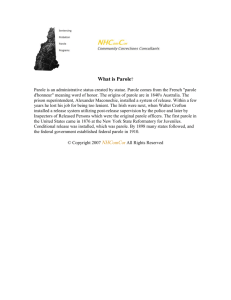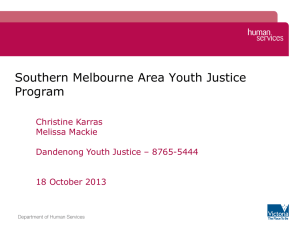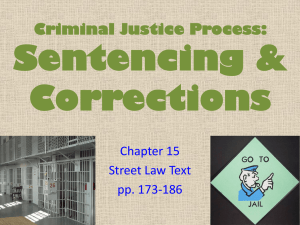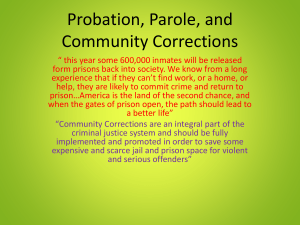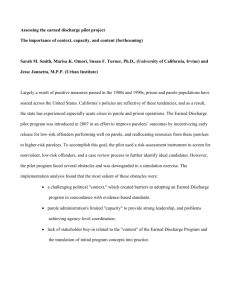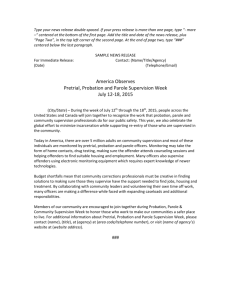PAROLE BOARD A body of appointed civilians that
advertisement
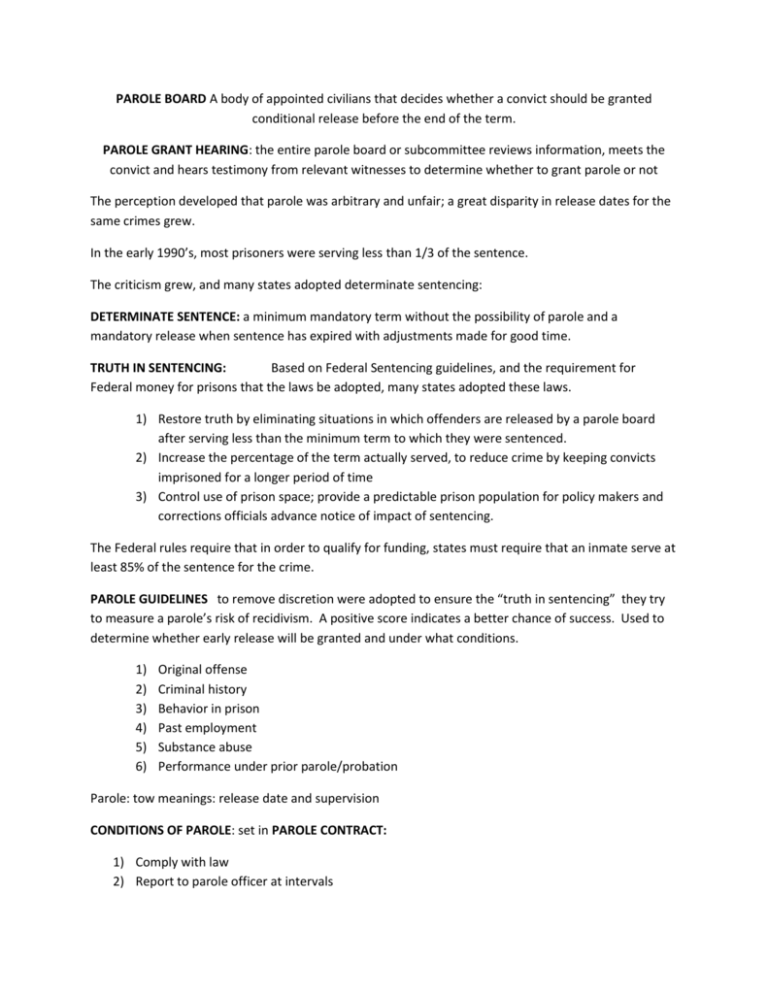
PAROLE BOARD A body of appointed civilians that decides whether a convict should be granted conditional release before the end of the term. PAROLE GRANT HEARING: the entire parole board or subcommittee reviews information, meets the convict and hears testimony from relevant witnesses to determine whether to grant parole or not The perception developed that parole was arbitrary and unfair; a great disparity in release dates for the same crimes grew. In the early 1990’s, most prisoners were serving less than 1/3 of the sentence. The criticism grew, and many states adopted determinate sentencing: DETERMINATE SENTENCE: a minimum mandatory term without the possibility of parole and a mandatory release when sentence has expired with adjustments made for good time. TRUTH IN SENTENCING: Based on Federal Sentencing guidelines, and the requirement for Federal money for prisons that the laws be adopted, many states adopted these laws. 1) Restore truth by eliminating situations in which offenders are released by a parole board after serving less than the minimum term to which they were sentenced. 2) Increase the percentage of the term actually served, to reduce crime by keeping convicts imprisoned for a longer period of time 3) Control use of prison space; provide a predictable prison population for policy makers and corrections officials advance notice of impact of sentencing. The Federal rules require that in order to qualify for funding, states must require that an inmate serve at least 85% of the sentence for the crime. PAROLE GUIDELINES to remove discretion were adopted to ensure the “truth in sentencing” they try to measure a parole’s risk of recidivism. A positive score indicates a better chance of success. Used to determine whether early release will be granted and under what conditions. 1) 2) 3) 4) 5) 6) Original offense Criminal history Behavior in prison Past employment Substance abuse Performance under prior parole/probation Parole: tow meanings: release date and supervision CONDITIONS OF PAROLE: set in PAROLE CONTRACT: 1) Comply with law 2) Report to parole officer at intervals 3) 4) 5) 6) 7) No drug use No association with known felons No change of address w/o notice to authorities Seek employment No firearms WORK RELEASE PROGRAM: a temporary release of an inmate from prison for purpose of employment. for low risk prisoners near end of sentence: ususlly return to facility in evening or to a residential halfway house. HALFWAY HOUSE: a community based form of early release that places inmates in residential center and allows them to reintegrate into society. Usually 10 -25 inmates, less institutional environment . PAROLE OFFICER: the correctional agent given the responsibility to supervise parolees. Enforce conditions of parole and initiate revocation process if necessary. Help parolee adjust to life on outside: find a place to live, a job, receive treatment. The conflict is: am I a law enforcement officer or a social worker? Good of the community & good of the parolee conflict. Must establish strong bonds of trust and try to change parolee’s behavior. MAXIMUM EXPIRATION DATE: the date on which sentence ends and parole is concluded. PAROLE REVOCATION: when a parolee breaks a condition of parole, the process of withdrawing parole and returning the convict to prison. @ 40% return to prison based on revocation of parole A technical violation may not result in revocation: not reporting. Commission of a crime will send convict back to prison. Two step process: is there probable cause that a violation occurred? If so, is parole to be revoked? MORRISSEY –V- BREWER (1972) Sup Ct. said prison has a “liberty interest” in remaining on parole, and has some due process rights to a hearing before revocation: 1) 2) 3) 4) Notice of charges Present witnesses Speak in his own defense Question hostile witnesses RECIDIVISM: 67.5% re-arrested for a new crime w/in 3 months of release: 50% + returned to prison for felony or parole violations

